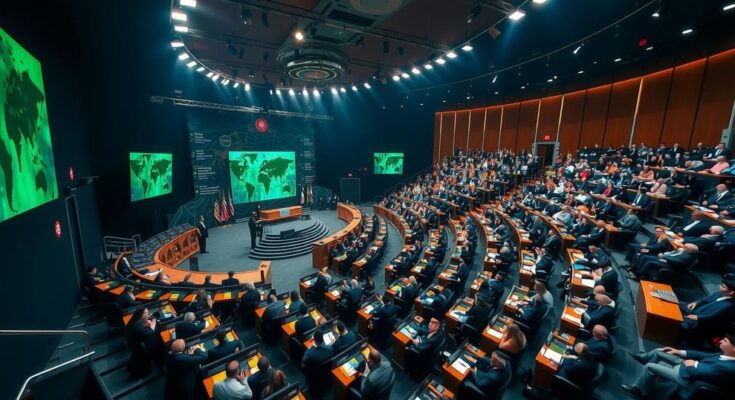COP29 has opened in Baku, focusing on financial commitments from wealthy nations to combat the climate crisis as developing countries demand trillions of dollars in support. The negotiations aim to establish a new climate finance target by 2025, with health experts stressing the importance of addressing the public health implications of rising temperatures. However, geopolitical tensions and the credibility of the host nation, Azerbaijan, pose challenges to the discussions. The urgency for action is echoed by the UN and health advocates.
The COP29 conference in Baku has commenced with a focus on securing a significant financial commitment from wealthy nations in light of the climate crisis. Developing countries are insisting that high-income nations fulfill their obligation by providing trillions of dollars to combat climate change, exacerbated by ongoing environmental disasters. A crucial element of the negotiations is establishing a new global climate finance target by 2025 to supersede the insufficient $100 billion annual pledge from 2009. Meanwhile, health experts emphasize the urgency of addressing rising temperatures, which pose threats to global public health, stressing that the investments must be grants rather than loans to avoid perpetuating cycles of poverty. The urgency is underscored by the World Meteorological Organization’s warning of 2024 being on course to be the hottest year recorded. Nonetheless, geopolitical tensions and historical disparities in emissions complicate the negotiations, with arguments centering around who should provide funding and in what amounts. The credibility of the climate talks has also been called into question, given that Azerbaijan, a petrostate, is hosting the summit. The call for accountability and immediate action is echoed by the UN’s climate chief, who advocates for decisive steps to avert catastrophic temperature rises. The conference’s outcome remains uncertain as various stakeholders vie for different approaches to financing climate action, risking further delays in a critical moment for global environmental governance.
The ongoing climate conference, COP29, represents a critical junction in global climate negotiations, particularly as countries grapple with the consequences of climate change that threaten both ecosystems and public health. A central challenge is the need for developed countries to provide substantial financial resources to assist developing nations in implementing effective climate action. Additionally, the recent UN findings highlight the pressing nature of climate impacts, emphasizing the health risks associated with rising temperatures. This meeting follows a series of ineffective negotiations and highlights the importance of a new collective financing framework critical for global efforts to meet the targets set by the Paris Agreement.
In conclusion, the COP29 conference in Baku stands as a pivotal moment for international climate negotiations, challenged by demands for significant financial commitments from developed nations. The necessity for equity in climate finance is paramount, and there is an urgent need to address health impacts rooted in climate change. Despite the complexities arising from differing national interests and the hosting of the conference by a petrostate, collective action driven by accountability and transparency is essential for navigating the climate crisis effectively. The world awaits decisive commitments and actions that can steer global efforts toward sustainable climate solutions.
Original Source: healthpolicy-watch.news




